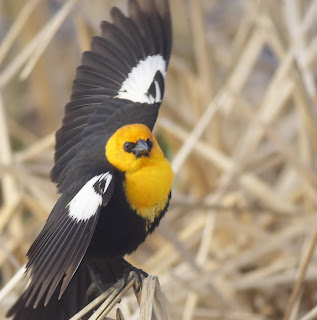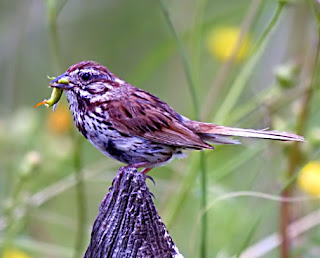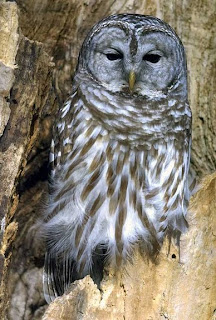Bird Behavior
The study of behavior (ethology) is where biology and psychology merge. Ethology has a whole body of terminology that we will only skirt here. Most of ethology has been built on ornithological studies of ethological pioneers: Konard Lorenz and Niko Tinbergen.
Basically they have looked for the answers to two questions:
1) All behaviors must have functional and biological significance. Behavior should incur evolutionary advantage to the individual, otherwise it will be selected out. Even behavior that seems trivial may be evolutionarily important. Black-headed Gulls always carry away empty egg shells. When ethologists put shells near the nests, crows found them and ate their young. Many behaviors are important for species recognition--and are also quite complex--IT IS IMPORTANT THAT THE BEHAVIORS ARE PERFORMED CORRECTLY. This leads to stereotyped or ritualized behavior which is often species specific. Ruddy Ducks bobbing their heads almost seem out of control--and, indeed, they may be.
2) Is behavior instinctive or learned ? Many ethologists now believe that there is a continuum between the two--many behavior patterns are subtle combinations of the two (an example may be the learning of bird song. Apparently birds have a rough template of bird song in their brain, but they need to smooth it out by learning.) On one side, you have species-specific actions like head scratching. All house sparrows scratch above their wings (indirect scratching) while all crows scratch under their wing (direct scratching). These are innate behaviors.
Basically they have looked for the answers to two questions:
1) All behaviors must have functional and biological significance. Behavior should incur evolutionary advantage to the individual, otherwise it will be selected out. Even behavior that seems trivial may be evolutionarily important. Black-headed Gulls always carry away empty egg shells. When ethologists put shells near the nests, crows found them and ate their young. Many behaviors are important for species recognition--and are also quite complex--IT IS IMPORTANT THAT THE BEHAVIORS ARE PERFORMED CORRECTLY. This leads to stereotyped or ritualized behavior which is often species specific. Ruddy Ducks bobbing their heads almost seem out of control--and, indeed, they may be.
2) Is behavior instinctive or learned ? Many ethologists now believe that there is a continuum between the two--many behavior patterns are subtle combinations of the two (an example may be the learning of bird song. Apparently birds have a rough template of bird song in their brain, but they need to smooth it out by learning.) On one side, you have species-specific actions like head scratching. All house sparrows scratch above their wings (indirect scratching) while all crows scratch under their wing (direct scratching). These are innate behaviors.
Yellow-headed Blackbird




Comments
Post a Comment